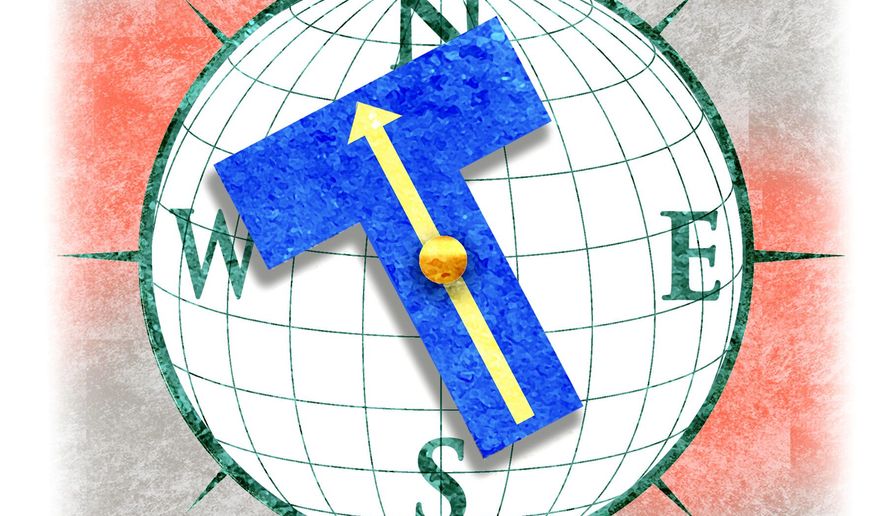OPINION:
As the COVID-19 crisis suggests, President Trump is changing U.S. foreign policy toward China and much more.
By appearances, critics claim that Mr. Trump’s “America First” foreign policy is a disaster. Alliances splinter in ruin, Russia and China rummage through the rubble, the Middle East and Afghanistan decompose, and pandemic stalks the globe, torpedoing economic growth and erecting new barriers to trade and immigration.
But the reality is quite different. True, NATO trembles under Trumpian rhetoric, but the United States and other members spend more on defense today than ever before, NATO forces stand on the borders of Russia for the first time since the end of the Cold War, and Ukraine receives lethal anti-tank weapons (which Mr. Trump approved and President Obama vetoed) to thwart further Russian aggression.
In the Middle East, Russia appears to gain by pushing Kurdish and U.S. forces away from the Turkish border and building out its military presence in the eastern Mediterranean. But in reality the United States advances its priority interests. It defeats ISIS, aggressively targets individual terrorists, stands athwart Iranian hegemony, closes ranks with Saudi Arabia, recognizes Israeli sovereignty in Jerusalem and the Golan Heights, and astutely avoids being sucked into land military conflicts with Turkey (a NATO ally), Iran (despite attacks on U.S., Iraqi and Saudi facilities) and Russia. Today, Russia’s casualties are growing in the region, not America’s.
By appearance, China stalks the island sea lanes of the Pacific and boasts that it has a better system. But realities differ. Mr. Trump is ready to grant Beijing great power status but insists that it play by the rules. He strengthens alliances with Japan and South Korea, out-maneuvers North Korea to shut down nuclear and long-range missile tests (for three years so far), and concludes phase 1 trade talks with China. Meanwhile he scolds Beijing for its deceptive behavior in the COVID-19 crisis and urges American firms in China to relocate to America.
In Afghanistan, Mr. Trump appears to be leaving. But in reality he is shifting to an offshore balancing strategy. No more nation-building or internal-power balancing. The Kabul government need only commit not to allow terrorists to train on its soil and attack America or its allies. If this commitment is broken, however, U.S. forces remain nearby to retaliate.
By appearances, globalization replaced superpower conflicts, created millions of new jobs and opened national borders. In reality it accelerated U.S. involvement in distant wars, facilitated Chinese theft of world markets, and spread deadly diseases as well as homeless refugees and immigrants. To better balance the benefits and burdens of globalization, Mr. Trump ripped up the ironclad American commitment to global security and world trade — or at least convincingly threatened to do so — and, “lo and behold,” allies and trading partners began to pay attention.
When NATO agreed in 2014 to raise defense spending, only three members met the 2 percent of GDP target; today nine members do, and 15 are on track to reach that level by 2024.
Renegotiated trade agreements rebalance not destroy large existing markets. The USMCA (new NAFTA) incentivizes North American markets and provides better protection against predators like China. The Korea-U.S. agreement (KORUS) increases U.S. auto imports, and the China phase 1 agreement boosts U.S. exports by $200 billion over two years. Even in immigration, Mr. Trump cuts deals with Mexico and Central American states to reduce asylum and illegal immigrants.
The COVID-19 crisis reinforced Mr. Trump’s view that globalism can persist only if nations and self-government come first. He acted nationally to stop travel, demanded accountability from international actors, such as the WHO, and championed America’s system of federalism and private industry as a superior alternative to Chinese autocracy.
Mr. Trump’s “nation first” foreign policy appears shocking because the world has not seen it for a while. But in reality it offers a needed course correction that may be the only way to salvage today’s globalized world. That world is full of democracies and open markets, not the racist, revanchist and xenophobic nations of the 1930s. But it is also unbalanced. After 70 years, America still shoulders disproportionate security and trade burdens.
NATO allies, Japan, and China have to step up. If they do, the postwar global system will persist and thrive. If they don’t, the system will fail — not however because Mr. Trump undermined it, but because the American people will not sustain it if allies continue to shirk burdens and China to milk markets.
Appearances deceive. Like Wagner’s music, Mr. Trump’s foreign policy is better than it “sounds.”
• Henry R. Nau is professor emeritus, George Washington University, and author of “Course Correction,” The National Interest, May/June 2020.




Please read our comment policy before commenting.